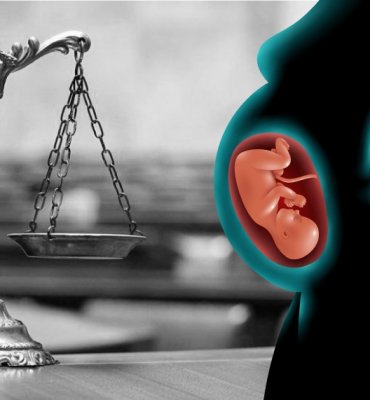
Being a welfare State there is a positive obligation upon the authorities to ensure awareness regarding reproductive health and reproductive rights.

By Akshiti Singhvi, Advocate
Assistant to Additional Advocate General,
Government of Rajasthan
The recent derecognition of the constitutional right of women to abort pregnancy in the United States of America has been a topic of conversation in many intellectual circles in India for quite some time now. One such discussion with a colleague made me realize that many misconceptions are prevalent when it comes to reproductive rights’ autonomy and their recognition under the Law for women in India. By ‘reproductive rights’ autonomy’, I am referring to the freedom of choice for every woman to either continue or terminate a pregnancy, including the right to safe and accessible means for termination. While the legal framework provided by our lawmakers is a far cry from absolute autonomy, I do take pride in saying that the amendments in law and judicial pronouncements have evolved to keep up with the pace of the changing social setup.
Prior to 1971, the Indian Penal Code, 1860 (IPC) criminalized the termination of pregnancy by any person except if done in good faith for the purpose of saving the life of the woman. Though the said provision of IPC still stands, however, the promulgation of the Medical Termination of Pregnancy Act in 1971 (“the Act”) heralded a much-welcome change by allowing, in certain circumstances, termination of pregnancy up to 12 weeks upon the opinion of one registered medical practitioner and up to 20 weeks upon the opinion of two Registered Medical Practitioners (“RMP”) formed as per the prescriptions of the Act. Most recently in 2021, this Act was substantially amended by the Medical Termination of Pregnancy (Amendment) Act, 2021, to suit the needs of our progressing and changing societal set-up. The objects and reasons behind the amendment reflected the acknowledgment by the lawmakers of the advancement in medicine and aimed at increasing access to safe, reliable, and legal methods of termination of pregnancy while enlarging the scope and ambit of the Act. A discussion of the Act would entail looking at some of the provisions of the Act which recognize the situations and conditions whereunder a woman can exercise the right to terminate and the inherent restrictions to such exercise.
The amendment to the Act in 2021 has enhanced the gestational limit for which termination under the Act is permissible. The law now permits termination in specific circumstances up to 20 weeks and for certain categories of women, from 20 to 24 weeks. The Act permits termination of pregnancy, if the RMP, in case of pregnancy up to 20 weeks (and not less than two RMPs in case of 20 to 24 weeks), is of the opinion that the continuance of pregnancy would put the woman’s life at risk or cause grave injury to her physical and mental health or there is a substantial risk that the child born shall suffer from serious physical or mental abnormality. The Act further explains what would constitute a grave injury to mental health and includes in its ambit the anguish caused to the woman if the pregnancy occurs on account of the failure of any birth control device or method used by the woman and her partner. Even the anguish caused to the woman if the pregnancy has allegedly occurred on account of rape shall constitute a grave injury to mental health. One may take note of the language used in the provision which contemplates a mere allegation of rape and there is no requirement of initiation of criminal proceedings, registration of F.I.R. or any proof of the sexual assault before an abortion can be carried out.
For termination of pregnancy between 20 to 24 weeks, the categories of woman for which termination is permitted has been provided in the Medical Termination of Pregnancy Rules, 2003 as amended in 2021. It includes 1) survivors of sexual assault or rape or incest, 2) minors, 3) women undergoing a change of marital status during the ongoing pregnancy (widowhood and divorce), 4) women with physical disabilities (i.e. major disabilities as defined under the Rights of Persons with Disabilities Act, 2016), 5) mentally ill women including mental retardation, 6) the fetal malformation that has substantial risk of being incompatible with life or if the child is born it may suffer from such physical or mental abnormalities to be seriously handicapped and 7) women with pregnancy in humanitarian settings or disaster or emergency situations as may be declared by the Government. Beyond 24 weeks of pregnancy, termination is permitted in case a Medical Board constituted under the Act is of the opinion that termination is necessary due to substantial fetal abnormalities.
A reader with a keen eye would note that an unmarried woman does not fall into any of the categories of women specified above who can terminate a pregnancy beyond 20 weeks. However, in 2022, the Hon’ble Supreme Court of India in its judgment in the case of X vs Principal Secretary, Health and Family Welfare Department, Government of NCT of Delhi & Anr., was pleased to extend the rights provided to married women for termination of pregnancy under the Act, to unmarried women also. In doing so the Court has substantially expanded the scope of the Act. The Apex Court has paved the way towards recognition of the sole autonomy of women over their reproductive rights, dignity, and the right to privacy of a female vis-à-vis the Medical Termination of Pregnancy Act.
The limits of the Act are spelled out in express terms from a plain reading of its provisions. However, some aspects of the Act are worth praising. The most laudable provision inserted by way of the amendment to the Act in 2021 is the punishment imposed upon RMPs for violating the right to privacy of the woman approaching them and disclosing her personal details. An unwanted pregnancy can arise from various reasons, which include rape, incest, fetal abnormalities, danger to the physical and mental health of the female, etc. It is no secret that our society still attaches a stigma to most of these. For any woman who chooses to terminate a pregnancy under any circumstance, the primary concern is respect for her privacy. The Act keeps the right to privacy of the female sacrosanct by imposing punishment upon the medical practitioner who reveals the personal details of the woman.
One provision enshrined in the law since 1971, which is closest to the principle of reproductive autonomy of women, is that it is only the woman’s consent that is required for termination, except in cases involving minor or mental illness, where consent of a guardian is necessary. Rather the Supreme Court has in so many words clarified that the law does not require the consent of any person other than the female herself and has deprecated the practice of RMPs to press upon consent of family or husband resulting in delay in an otherwise time-sensitive issue. Awareness of this right and its recognition by medical professionals can avoid a lot of legal hassle at the right time.
But the law is ever-evolving and there is always scope for improvement. The law as it stands today, does not give an absolute right to the female for termination of pregnancy and the tenor of the Act makes it abundantly clear that the opinion of RMP plays a pivotal role. Hence, comes into picture the indispensable role of a medical practitioner. It is for medical professionals to recognize the responsibility cast upon them by law and to act in the best interests of the females seeking help in times of distress. Due to the lack of sex education in our country, many couples are deprived of the knowledge of the use of contraceptives and appropriate steps to take in the event of an unwanted pregnancy. A huge responsibility rests on the shoulders of medical professionals, not only to render adequate service if approached but also to create an environment where any woman- married, unmarried, or minor is enabled to step over the social stigmas and seek medical help in a free and safe environment.
As dismaying as it may be, the complexities arising out of the intertwining of various statutes, like the Prevention of Children Against Sexual Offences Act (POCSO Act) and the MTP Act as an example, sometimes create a Catch-22 situation for medical practitioners to give full effect to this beneficial legislation. When faced with such a circumstance, where the medical practitioners have had their hands tied, I am relieved to say that the High Courts and the Supreme Court of this country have stepped in the aid of females seeking to terminate a pregnancy. Albeit a few unfortunate cases, the endeavor of the courts has been towards speedy disposal of any such case with effective directions to the authorities. Here the advocates who represent any female in such a circumstance in a court of law play a pivotal role in ensuring that the right platform is chosen, and swift action is taken in approaching the Courts. Every minute a woman carries an unwanted pregnancy that can be terminated under the law signifies a failure by medical and legal professionals to uphold and protect her physical and mental rights.
No beneficial legislation can be given optimal effect till the State plays its role in executing it. The law may have been enacted, but the reality of the high maternal mortality rate due to unsafe abortions still stares right at us, hinting at the sub-optimal implementation of the law. Being a welfare State there is a positive obligation upon the authorities to ensure awareness regarding reproductive health and reproductive rights. We may still be far from recognizing the complete autonomy of women in reproductive rights. Still, even for the law as it exists today, to achieve its desired objectives, the key stakeholders i.e. Government, medical practitioners, and legal professionals need to play an active part in spreading awareness about the rights of the beneficiaries of the law – the women of the country. The right to complete autonomy in the termination of pregnancy can only become a reality in the future when women are enabled to exercise their rights under the Act.










